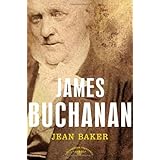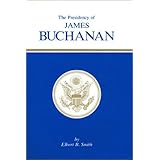
Average Reviews:

(More customer reviews)Are you looking to buy James Buchanan: The American Presidents Series: The 15th President, 1857-1861? Here is the right place to find the great deals. we can offer discounts of up to 90% on James Buchanan: The American Presidents Series: The 15th President, 1857-1861. Check out the link below:
>> Click Here to See Compare Prices and Get the Best Offers
James Buchanan: The American Presidents Series: The 15th President, 1857-1861 ReviewThe author, Jean Baker, wrote on page 1 "After the election of James Madison....no president had ever come to office with more impressive credentials. Nor, to this day, has any matched Buchanan's public positions." Buchanan served in the Pennsylvania state legislature, served in the U.S. House and Senate, was Andrew Jackson's minister to Russia, was secretary of state under James Polk, and was minister to the Court of St. James in the 1850s.With his background, the question must be asked "why was Buchanan, arguably, our worst president?" The author states "This book seeks to suggest some of the reasons for Buchanan's failure and specifically to explain the gap between Buchanan's experience and training before his presidency and his lamentable performance in office.... only in the literal sense did the Civil War begin.... When the Confederates fired on Fort Sumter. It began in Buchanan's administration."
The book outlines Buchanan's political career. While still a Unionist, by the 1830s he was "more and more a states rights man" as he gravitated toward southerners after arriving in Washington and considered New Englanders radical extremists. By the 1840s, he opposed any interference with slavery and by then desperately wanted the presidency. In the Senate he espoused the principle of manifest destiny. As a bachelor he cultivated southern friends many of whom, as president, he included in his cabinet.
Having observed chief executives for more than thirty-five years, when Buchanan took the presidential oath in 1857, he knew more about the American presidency than anyone in the United States. However, the composition of his "cabinet revealed the incoming chief executive as no peacemaker...." Who was ".... surrounded by advisers who agree with him." The author narrates Buchanan's presidency as he moved from one ill-advised solution after another when solving critical problems. He continued his strong pro-southern attitude and acted accordingly. He unethically influenced the court's decision on the Dred Scott case, and seriously mishandled the situation in Kansas. The author notes "By taking the side of the South, Buchanan had split the Democrats, and in the process he had ensured his nightmare: the election of a Republican in 1860...." stating "The destructive effects of the president's policy were immediately apparent in the 1858 fall congressional elections when a disproportionate number of northern Democrats lost...."
The text gives a fascinating account of Buchanan's final year as president. The text notes that in 1857 Buchanan had sent troops into Utah to handle a problem with Brigham Young and the Mormons; yet when the secession crisis developed, and the Fort Sumter confrontation developed, he failed to respond firmly in like manner thereby encouraging secession. Amazingly his southern cabinet members and political associates treasonably passed critical government plans and information to the seceding state governments. Interestingly, the author notes "Buchanan's failing during the crisis over the Union was not inactivity, but rather his partiality for the south, a favoritism that bordered on disloyalty in an officer pledged to defend all the United States...." and continues "He was that most dangerous of chief executives, a stubborn, mistaken ideologue whose principles held no room for compromise."
The last chapter addresses the question why did such an experienced and intelligent politician failed so miserably as president of the United States? The text states "The answer speaks to one of the palpable characteristics of failed presidencies-the arrogant, wrongheaded, uncompromising use of power...."; and continues "His presidency did not suffer from feebleness or insufficient power or administration by a senile sixty-eight old. But the problem that he used the power with such partiality for the South." The author concludes "Ultimately Buchanan failed to interpret the United States."
The reader may ask why study a failed presidency. Such study is important for guidance it provides to future national leaders. In the words of George Santayana "Those who cannot remember the past are condemned to repeat it." The country can ill-afford another Buchanan type presidency.
Reading Buchanan's biography brings to mind the Peter Principle theory originated by Dr. Laurence J. Peter in 1969 regarding an individual being advanced to his level of incompetence. Clearly, Buchanan had a good resume; but when he advanced to a position where compromise, teamwork and leadership were paramount, he had reached his level of incompetence.
This should be a "must read" for those interested in the political/governmental aspects of the Civil War.
James Buchanan: The American Presidents Series: The 15th President, 1857-1861 OverviewA provocative reconsideration of a presidency on the brink of Civil WarAlmost no president was as well trained and well prepared for the office as James Buchanan. He had served in the Pennsylvania state legislature, the U.S. House, and the U.S. Senate; he was Secretary of State and was even offered a seat on the Supreme Court. And yet, by every measure except his own, James Buchanan was a miserable failure as president, leaving office in disgrace. Virtually all of his intentions were thwarted by his own inability to compromise: he had been unable to resolve issues of slavery, caused his party to split-thereby ensuring the election of the first Republican president, Abraham Lincoln-and made the Civil War all but inevitable. Historian Jean H. Baker explains that we have rightly placed Buchanan at the end of the presidential rankings, but his poor presidency should not be an excuse to forget him. To study Buchanan is to consider the implications of weak leadership in a time of national crisis. Elegantly written, Baker's volume offers a balanced look at a crucial moment in our nation's history and explores a man who, when given the opportunity, failed to rise to the challenge.
Want to learn more information about James Buchanan: The American Presidents Series: The 15th President, 1857-1861?
>> Click Here to See All Customer Reviews & Ratings Now

